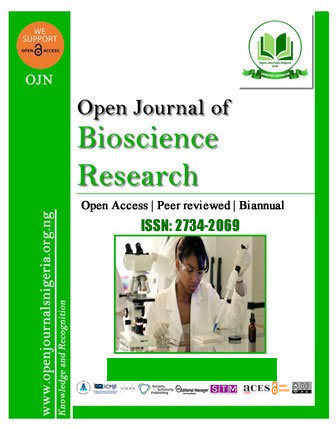BIODEGRADATION OF TOTAL PETROLEUM HYDROCARBON FROM OILFIELD WASTEWATER USING BACTERIA CONSORTIUM
DOI:
https://doi.org/10.52417/ojbr.v5i2.583Abstract
Oilfield wastewater poses significant environmental risks due to high levels of total petroleum hydrocarbons. Biodegradation offers a promising solution for mitigating these risks. This study intended to biodegrade total petroleum hydrocarbons (TPH) present in oilfield wastewater (OFWW) through the utilization of a mixed bacterial culture. Bacteria were isolated from OFWW and included Morganella morganii, Pseudomonas xiamenesis, Staphylococcus sp, and Chryseobacterium cucumeris. Initial TPH concentration was 381.87 mg/L in 125 ml OFWW. Bacteria were added (6.25 ml) to separate flasks, combinations varied from two to four bacteria, with a control lacking bacteria. Flasks were incubated at 28°C, 200 rpm. TPH was analyzed using Gas Chromatography at days 1, 7, and 21. By day 21, the removal of TPH recorded highest percentage removal of 96.8 % in the mixed culture using three bacterial species of Morganella morganii + Pseudomonas xiamenesis + Chryseobacterium cucumeris, followed by the mixed culture of four (Morganella morganii + Pseudomonas xiamenesis + Staphylococcus sp + Chryseobacterium cucumeris) which recorded 96.2% removal and the mixed culture of Morganella morganii + Chryseobacterium cucumeris recorded 92.8%. The bacterial treatments exhibited high efficacy in degrading individual hydrocarbons, within 21 days. This suggests that the bacterial consortia were able to degrade most hydrocarbon compounds, but some recalcitrant compounds like C9 and C14 may require further degradation time or specialized enzymes.
Published
How to Cite
Issue
Section
Copyright (c) 2024 Obire et al.

This work is licensed under a Creative Commons Attribution 4.0 International License.





















